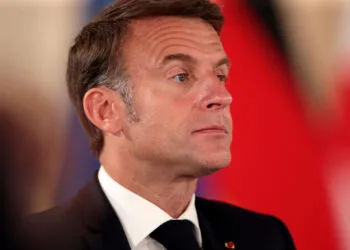Brussels – The saga of the formation of the new French executive has no end in sight: today, the first round of consultations launched Friday by President Emmanuel Macron with representatives of the main political forces in Parliament to find an understanding on the name of the next premier ministre came to an end. However, a conclusion is unlikely, and turmoil continues in the leftist camp.
Let’s start with the numbers. In a historic, unprecedented event for the Fifth Republic, last July’s early elections handed the country to a highly fragmented Assemblée Nationale, in which none of the three main blocs can govern alone with votes counted on a razor’s edge (the absolute majority threshold in the House is 289 out of the total 577). The Left Coalition, under the banner of the Nouveau Front Populaire (NFP), has 193 seats: of these, 72 are from the radical left of Jean-Luc Mélenchon, leader of La France Insoumise (LFI), 66 from the Parti Socialiste (PS), 38 from the Ecologists and 17 from the Communists. The former presidential majority, Ensemble, has 166 elected members among Macron’s party, Renaissance (99 deputies), Mouvement Démocrate (36) and Hórizons (31). The extreme right of the Rassemblement National (RN) and its allies have 142 MPs. The Républicains (LR) of the center-right (who are still trying to defenestrate leader Éric Ciotti, guilty of teaming up with Marine Le Pen) have elected 39 lawmakers.
Therefore, the game to form the new executive is particularly delicate since the French political culture is not used to compromises and varied coalitions, unlike in Italy. The rest of the Republican arc considers the two most representative parties in Parliament, LFI on the left and RN on the right, too extreme and unacceptable. In this context, Macron is confident that he can continue to hold his cards despite the bitter electoral defeat in the European elections – that set in motion the early legislative bandwagon, in which his Renaissance brought home an unhoped-for second place (thanks, however, to the strategy of the premier, Gabriel Attal, to campaign in person by distancing the party from the figure of Macron).
NFP wants economist and civil servant Lucie Castets in Palais Matignon, the prime minister’s residence. However, monsieur le Président had already rejected her name last month, and he seems intent on standing firm on the “no” to the progressive front’s candidate. He had hoped to fragment the front by putting the veto on the participation of the “Insoumis” in the government — a strategy that puts pressure on LFI’s more moderate allies, starting with the Socialists, who are increasingly impatient with the barricaded leader of the radical gauche.
After threatening Macron’s impeachment, Mélenchon stepped back, proposing an alternative formula to the Assembly’s political interlocutors in exchange for their commitment not to vote on a censure motion: the NFP in government with Castets, but without the LFI. “If Lucie Castets’ government did not include any Insoumis ministers, would you commit not to vote for censure and allow her to implement the program for which we came out victorious in the legislative elections?” he asked the center and right-wing parties on TV. According to some analysts, this was a game of anticipation on the part of the leftist leader, with which he seeks to take the president off-guard (who, by putting “offside” the largest party in the progressive front, thought he was pushing away the prospect of an NFP government). According to others, it is a maneuver to pave the way for the 2027 presidential elections: if this agreement brings the Populaire Front to government, it will have been Mélenchon’s merit. If the government goes wrong, it will not be his responsibility.
Be that as it may, the proposal has not yielded results for now. Friday’s consultations with the united delegation of the left (led by Castets) did not lead to a decisive outcome, even if the economist praised Macron’s “lucid” attitude. However, he still seems “tempted to create his own government.” The head of state does not like the idea of a government that would carry out the NFP program (from the minimum wage to the abolition of the disputed pension reform sought by Macron). He is still considering a centrist executive putting together moderate deputies from the left and the right (i.e., from the Socialists and Les républicains).
For the moment, therefore, no white smoke. Le Pen’s radical right, convened this morning for consultations, is watching without directly taking part in the game, while on the left, the waters continue to be choppy. Socialist leader Olivier Faure has once again called the Elysée to its responsibilities, trying to call out the president’s bluff: Macron’s “pretext” “to reject Lucie Castets’ nomination has been removed” with Mélenchon’s move, he told Franceinfo this morning. “In the name of what divine right would there be an opportunity for people who have lost an election to say who governs and who does not govern?” the MP asked, stressing that the NFP does not intend to “impose” its program: “We will present what voters have asked us to produce and defend, and then there will be a debate in Parliament to find compromises, and even consensus, to allow the country to achieve the best possible result.”
President Macron has not yet responded publicly to Mélenchon’s proposal. But he could address the nation as early as this evening to provide his reading of the latest developments to the French public, which, for over two months, has been governed by an outgoing executive and, in all likelihood, will still have to wait to have a premier with full powers.
English version by the Translation Service of Withub





